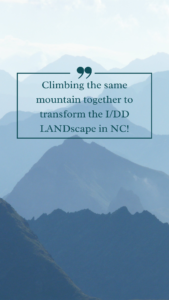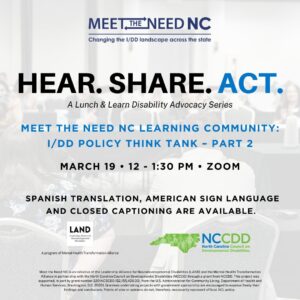
Welcome to Meet the Need NC’s monthly newsletter featuring what the initiative is up to and how you can join our efforts to meet the service and supports needs of North Carolinians with intellectual or other developmental disabilities (I/DD) and their families.
In this month’s newsletter:
Message from LAND, the Backbone of Meet the Need NC
Transforming the I/DD LANDscape in North Carolina
Collective Impact: Changing the Landscape of I/DD across North Carolina

Collective impact brings people together in a structured way to achieve social change. Diverse groups of stakeholders meet regularly, growing trust and interest, with the objective of developing a common agenda or shared aspiration.
Meet the Need NC is a grassroots movement to bring systems change to our intellectual or other developmental disabilities (I/DD) Community in North Carolina. We have been immersed in a collective impact model for over two years now.
LAND is the backbone organization for Meet the Need NC. Our advisory groups meet regularly, providing expertise and insight to the initiative by utilizing the broad professional and lived experience of members. As a whole and individually, our advisory groups have tapped into their own advocacy networks to amplify message outreach, pulling together overlapping and, at times, different agendas. We have not always agreed because of the intentional diversity of the groups. We come from many different perspectives and this can be difficult at times.
LAND brings values to guide Meet the Need NC to help move us forward toward our collective goal of improving the lives of those with I/DD and their families. These are our values and what makes the collective impact experience unique to those who join us at the table: equal voice for everyone who participates; respect for all opinions and people; and check your personal or organization’s “hat” at the door when you come to the table for the good of all.
In November 2023, LAND brought together other I/DD thought leader voices to our collective impact process for change through an I/DD Policy Think Tank. Forty-seven organizations attended in person and online. We broke into groups randomly and were asked: What are the most important issues for our I/DD Community in 2024? We divided the data into broad categories, and then our advisory groups assessed and voted on issue priorities.
During our February 2024 webinar, we invited even more people to come look at the data we collected during our Fall Policy Think Tank. We had over 100 attendees from stakeholder categories across systems, disabilities, age, culture, and region. There were people from state agencies, LME-MCOs, nonprofits, providers, and universities. Most importantly, there were people with I/DD lived experience at the table. We looked together at which issues had risen to the top as the most important to focus on now:
- Accessible information about I/DD services and supports
- Medicaid Innovations Waiver slots
- LME-MCO connections
- Direct Support Professionals (DSP) messaging
Our next steps are to turn these categories into SMARTIE goals (Strategic, Measurable, Ambitious, Realistic, Time-Bound, Inclusive and Equitable). Please join us on Tuesday, March 19 for Part 2 of the February webinar when we will review SMARTIE goals, and then develop strategies together.
Thank you for staying engaged and being part of the movement to make change in the lives of those with I/DD and their families now and for the generations to come. We need everyone’s voice to do this.
Elizabeth Field, M.S.
Program Director
Meet The Need NC is an initiative to change the intellectual and other developmental disabilities (I/DD) landscape across the state and is funded by the North Carolina Council on Developmental Disabilities. Meet The Need NC is driven by the Leadership Alliance for Neurodevelopmental Disabilities (LAND), a program of the 501c3 nonprofit, Mental Health Transformation Alliance (MHTA). Learn more about LAND at https://mentalhealthtransformationalli.godaddysites.com/land.
February Lunch & Learn Webinar Recap
Meet the Need NC Learning Community: I/DD Policy Think Tank – Part 1
During the February webinar, we shared data collected during our Fall Policy Think Tank to discuss which issues identified by the Policy Think Tank that have risen to the top as the most important to focus on now which are:
- Accessible information about I/DD services and supports
- Medicaid Innovations Waiver slots
- LME-MCO connections
- Direct Support Professionals (DSP) messaging
Attendees were a part of the discussion by providing input and asking questions facilitated by Linda Kendall Fields from the Collective Impact and Ann Rodriguez, Parent Advocate.
Our next step is to turn these categories into SMARTIE goals (Strategic, Measurable, Ambitious, Realistic, Time-Bound, Inclusive and Equitable). Those goals will be the topic of discussion for this month’s Lunch & Learn webinar on Tuesday, March 19.
Webinar Resources
- Watch the webinar recording (English)
- Watch the webinar recording (Spanish)
- Download the slide presentation
About the Host and Facilitators

Host: Elizabeth (Beth) Field, M.S. brings a lived experience perspective to all aspects of her work and life. In 2019, Beth formed LAND (Leadership Alliance for Neurodevelopmental Disabilities), an advocacy organization made up of those with lived experience, to meet the needs of those with developmental disabilities and their families. LAND is a program of the Mental Health Transformation Alliance. Beth has 30+ years of strategic communications and marketing experience with public and private organizations in the areas of health and science.

Facilitator: Linda Kendall Fields, M.Ed. is a Collective Impact Consultant and has dedicated over 35 years to building communities that are responsive to the needs and contributions of older adults, people with disabilities and families in Minnesota, Oregon, Ohio, Georgia, and North Carolina.
She has been at the UNC School of Social Work in Chapel Hill since 2015 as Clinical Associate Professor and now as Director of the Cares Program. In this role, she leads a team that is dedicated to facilitating systems change with and for adults of ages. Noteworthy projects include the Rethinking Guardianship initiative, the Supported Living Action Team, the Dementia Capable NC Coalition, and NC Money Follows the Person’s Building Home & Community-Based Services through Collective Impact initiative.

Facilitator: Ann Rodriguez serves as a Parent Advocate on the Leadership Alliance for Neurodevelopmental Disabilities. She is the parent of a young adult with learning differences and a General Anxiety Disorder. Ann’s work intersects with her personal drive to impact policies that will strengthen the services and supports for individuals with disabilities. She is the Executive Director for the i2i Center for Integrative Health. Her primary responsibility is identifying key issues and the direction of the i2i Center’s policy work. Ann is an experienced facilitator and plays an integral part in all aspects of collaborative development. Ann values the partnerships and collaborations with all stakeholders of the MH/IDD/SUD system and works to include all stakeholders in policy making.
Ann’s early professional experience included legislative support to the U.S. Senate as well as nursing home administration. Since 1994, through her work with the NC Council of Community Programs and now the i2i Center, she further developed her skills in facilitation and policy development. Ann holds a Master of Health Administration from Tulane University and a Bachelor’s in Sociology from the University of Maryland.
LENS: Lived Experience Network Speaks

LENS, which stands for Lived Experience Network Speaks, is a blog provided by Meet The Need NC from our LENS Advisory Group. LENS includes individuals with intellectual and/or developmental disabilities (I/DD) experience, including people with I/DD, families, and caregivers with separate groups for those who speak English or Spanish.
We provide a space for them to share freely, but these opinions do not necessarily represent those of Meet The Need NC or all members of the LENS Advisory Group.
Collective Impact Explained: An Interview with Linda Kendall Fields

For this month’s blog, Linda Kendall Fields, facilitator for our I/DD Policy Think Tank was interviewed by Cheryl Powell, co-chair of the LENS advisory group. Cheryl caught up with Linda to ask a few questions to help people to better understand what “collective impact” is all about.
Please take a moment to read Linda’s answers to Cheryl’s questions.
Considering that collective impact may be difficult for many to understand, can you please explain collective impact in a way that is easily understood?
Collective impact is when a group of people and organizations work together to solve a big problem in a better way. By joining forces and sharing ideas, they can make a bigger and more positive impact on the problem they are trying to solve.
There are five important parts in a successful collective impact project, such as Meet the Need NC. They are:
- Common Agenda: Everyone agrees on the same goal or problem to focus on.
- Shared Measurement: Everyone uses the same way to measure progress and success.
- Mutually Reinforcing Activities: Different groups work together and do things that help each other reach the goal.
- Continuous Communication: People talk and share information regularly to stay connected and informed.
- Backbone Support: There is a group or organization that helps coordinate and support the efforts of everyone involved.
What are the most beneficial things about collective impact in your opinion?
In my opinion, the most beneficial things about collective impact are:
- Strengthened relationships, where each person’s voice is valued and people in the group build trust and reliance on each other;
- Less competition and more sharing of ideas, skills, and resources to achieve a common goal; and
- By working together through collective impact, groups can create long-lasting solutions and improvements that would not be possible if they worked alone.
Can you give examples of what successes you have seen by using collective impact?
In North Carolina, I have had the opportunity to see how collective Impact was able to fundamentally change the way people understand choice and self-determination for people with disabilities through the Rethinking Guardianship NC initiative. This eight-year initiative has produced widespread awareness, education and just this year, lead to the passage of the Guardianship Rights Law in NC, which reformed the system so that people know their rights and avoid unnecessary guardianship.
Other examples of collective impact in the state and country include:
- Decreasing homelessness: Organizations, government agencies, and shelters work together to provide housing, support services, and job training for homeless individuals, leading to a decrease in homelessness rates.
- Improving education: Schools, parents, and community organizations collaborate to create after-school programs, tutoring services, and mentorship opportunities for students, resulting in improved academic performance and graduation rates.
Thank you, Linda, for the helpful information! For more information about Linda, see her bio in our “February Webinar Recap” article of this newsletter.
Hear. Share. ACT! Put Your Knowledge into Action!
The way Meet the Need NC works can be summed up in three words: Hear. Share. Act.
- The “Hear” comes from attending our monthly webinars.
- The “Share” comes from the information we provide in our monthly newsletter, and on Facebook and Instagram.
- And the “Act” is what this column is about.
This is where we provide information on an issue to educate and inform you about how you can be a part of making a difference. The issues we choose relate to our Vision and Mission to for individuals with intellectual or other developmental disabilities and their families in North Carolina through a common agenda.

Take action on North Carolina’s Draft Olmstead Plan for 2024-2025
This month, we encourage you to take action on the draft Olmstead Plan for 2024-2025 issued by the North Carolina Department of Health and Human Services (DHHS). Public comment on the Olmstead Plan is open through March 7, 2024.
North Carolina’s draft Olmstead Plan is designed to assist people with disabilities to reside in and experience the full benefit of inclusive communities in our state. The final, two-year plan will be published in April and implemented in calendar years 2024 and 2025. Read the NC Department of Health and Human Services press release here: NCDHHS Releases Draft Olmstead Plan, Public Comment Open Through March 7
Our suggested ACTs this month are simple. Pick one or pick all!
ACT 1: Familiarize yourself with Olmstead
Olmstead is the common reference to the U.S. Supreme Court’s 1999 landmark decision in Olmstead v. L.C. which found the unjustified segregation of people with disabilities is a form of unlawful discrimination under the Americans with Disabilities Act (ADA). It says people with disabilities have a qualified right to receive state funded supports and services in the community rather than institutions when the following three-part test is met:
- The person’s treatment professionals determine community supports are appropriate;
- The person does not object to living in the community; and
- The provision of services in the community would be a reasonable accommodation when balanced with other similarly situated individuals with disabilities.
Learn more about Olmstead:
- Olmstead Rights.org
- Serving People with Disabilities in the Most Integrated Setting: Community Living and Olmstead (hhs.gov)
ACT 2: Review NC’s Draft Olmstead Plan
Read or skim through North Carolina’s draft plan: Download the 2024-2025 Draft Olmstead Plan (opens a Word document). The plan focuses on five priority areas:
- Increase opportunities for individuals and families to choose community inclusion through access to Medicaid waiver home- and community-based services.
- Strengthen opportunities that prevent individuals with disabilities from entering an institution or other congregate setting that separates them from the community.
- Address gaps in community-based services such as housing, employment, transportation and services that impact community life.
- Increase opportunities for pre-employment transition services for youth with disabilities and competitive, integrative employment opportunities for adults with disabilities.
- Strengthen opportunities for individuals with disabilities transitioning from the criminal justice system to successfully reenter into inclusive communities.
ACT 3: Forward to Others
Share the information that you have learned, including the resources provided in this article, to others. Many in our I/DD Community do not know about North Carolina’s Olmstead Plan.
ACT 4: Comment on the Plan
Provide comments on the draft Olmstead Plan and encourage others to do the same. To submit public comment, email the Technical Assistance Collaborative (TAC) at ncolmstead@tacinc.org. Deadline to submit your comments is Thursday, March 7, 2024.
Register for the March Lunch & Learn Webinar
Meet the Need NC Learning Community: Part 2 — Working Together to Bring Priority I/DD Goals to Action
Join us on the third Tuesday of each month at noon to listen to discussions on new topics brought to you by thought leaders in the intellectual or other developmental disabilities (I/DD) community.
 Our next Lunch & Learn will be on Tuesday, March 19, 2024, from 12pm – 1:30pm when the topic will be Meet the Need NC Learning Community: Part 2. Please note that this month’s webinar will end at 1:30pm rather than 1:00pm.
Our next Lunch & Learn will be on Tuesday, March 19, 2024, from 12pm – 1:30pm when the topic will be Meet the Need NC Learning Community: Part 2. Please note that this month’s webinar will end at 1:30pm rather than 1:00pm.
About the webinar:
We return on March 19 to put action steps to our four priority I/DD goals for Meet the Need NC. Ann Rodriguez and Linda Kendall Fields will again guide us through the next steps of our collective impact process. Don’t worry if you were not able to attend Part 1. We will catch you up.
Thank you for staying engaged and being part of the movement to make change in the lives of those with I/DD and their families. We need everyone’s voice to do this!
Register here!
Throughout our monthly webinar series, Meet the Need NC aims to create a basic understanding of the unmet needs of those living with I/DD in North Carolina. For more information, including our 2024 webinar schedule, go to our Lunch & Learn Webinar Schedule & Registration web page.
Let’s get social!
Want to stay informed about issues that are important to you and your community? Follow us and subscribe to our newsletter! Here’s where to find us:
- Follow us on social media on Facebook and Instagram.
- View our Lunch & Learn webinar recordings and other video clips on our YouTube channel.
- Listen to our podcast, The Waiting Room, hosted by Kenneth Kelty.
- Visit our website for updates, resources and links to other helpful websites.
- Join our email list to receive upcoming webinar registration information and our monthly newsletter.
Most importantly … share this information! Encourage others to subscribe to our newsletter and follow us on social media so they, too, can be part of Meet the Need’s vision and mission to change the I/DD landscape across North Carolina through a common agenda. Together, we can make it happen!
